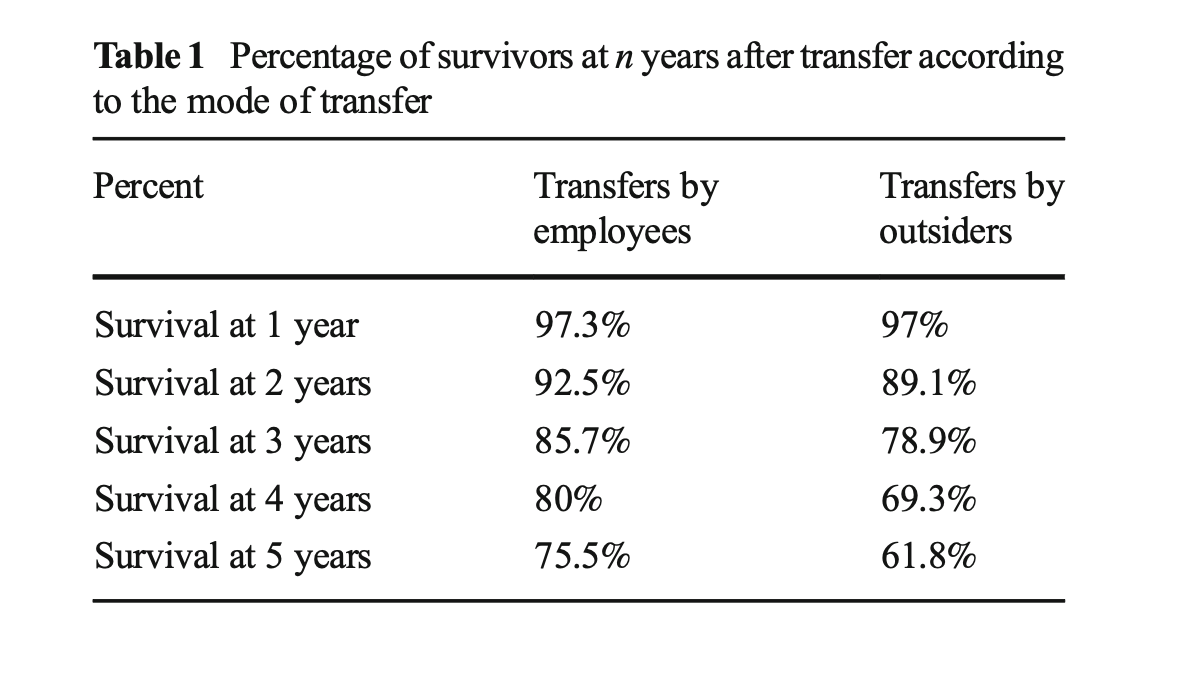Not quite ready to sell?
Subscribe to receive the latest resources for small business owners.
Among the exit options a small business owner has, selling the business to an employee stands out in terms of its advantages. While some business owners may not have employees who have the management skills or financial means to take over the business, those who do have potential fits should seriously consider selling to an employee.
A recent study conducted by researchers at the University of Caen Normandy in France dug into data of small business transfers. Published in the Small Business Economics journal and highlighted three ways that make employees stand out from other buyers.
Price Transparency
One large point of friction with small business transfers is around the sales price.
Owners are notorious for over-valuing their business, believing that it’s unique and better poised to growth. On the other hand, many buyers are first-time owner operators and may view the business acquisition as simply buying some equipment.
Even in the absence of such biases, it’s hard for a buyer to have enough context to understand the true value of the business, much less to understand whether the current asking price is a reasonable amount. Immediately familiar with business.
Customer and Employee Stability
When reviewing the valuations for businesses such as accounting firms, hair salons, or medical practices, owners are often surprised that they do not have a higher multiple on their seller’s discretionary earnings. A reason for this is often because of the risk that customers and/or employees will churn when the owner leaves.
This is especially concerning for businesses where there is high customer concentration, or where the current owner has a cult-of-personality - not a rare occurrence with small enterprises.
For current employees, this is much less of a concern. They will have built up relationships with key customers over the years. They will also be well acquainted with their coworkers and often have already carved out a leadership role, which is why the owner would be considering them in the first place.
"They are able to smoothly prepare the transfer with the vendor, and stakeholders will be reassured regarding continuity of business. They want above all ensure the long-term existence of the firm and of their jobs." - Bastie, Francoise & Cieply, Sylvie & Cussy, Pascal (2018)
Industry Experience
Lastly, most owners want their businesses to thrive after they’ve left the helm. This comes from a variety of factors. First, many deals include some component of seller financing, so the the seller receiving their full asking price is contingent upon the business doing well. But, second, the owners have often invested decades of their lives and their savings into starting and growing their business. They want it to continue on, as their impact on the world.
Given that employees have acquired industry experience for a number of years and have seen how the owner has managed the business, they are often much better suited to long-term success than external buyers.

If you think of the equation to succeeding in small business ownership as some mix of skills, relationships, marketing and execution, then the employee has had time to absorb the equation that the current business owner has perfected. The owner has beaten the famous 5 year mark, when nearly half of small businesses will have failed, and has forged a stable, healthy enterprise.
------
While these are the key benefits of selling to an employee, there are definitely some downsides. For instance, the study in France found that although employees have a greater chance of long-term success than third-party buyers, they are often much more risk averse. They hesitate to make changes to the business and may lack the confidence in their managerial abilities to make tough personnel decisions.
At the end of the day, each business owner needs to understand their goals in exiting their business and make a personal decision, but selling to employees has a lot to offer and should be seriously considered.
Not quite ready to sell?
Subscribe to receive the latest resources for small business owners.

Will founded Beacon with the mission to help the current generation of owners to retire while enabling the next to unleash their entrepreneurial spirit. He comes from a business background having graduated from the Wharton School with a B.S. in Economics.
Information posted on this page is not intended to be, and should not be construed as tax, legal, investment or accounting advice. You should consult your own tax, legal, investment and accounting advisors before engaging in any transaction.

Calder Capital

Sam Domino


